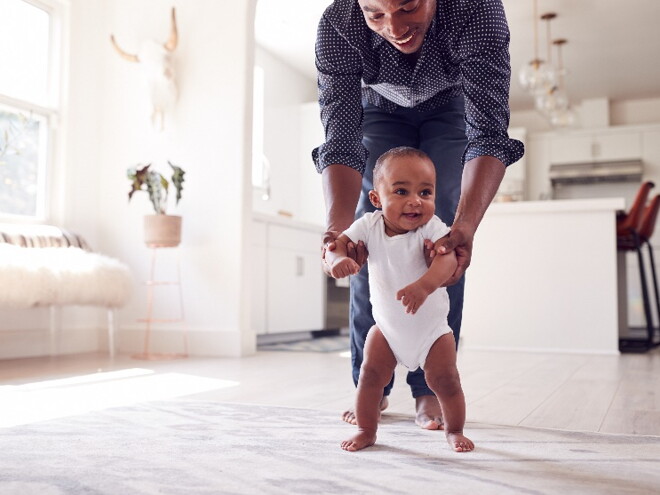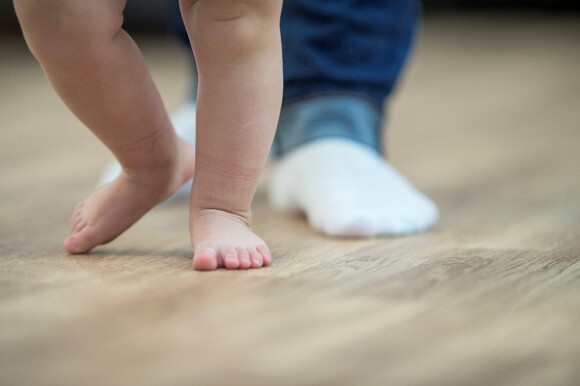
Guiding Your Baby's First Steps: A Milestone to Cherish
Unlock the secrets to nurturing your baby's first steps with expert tips and insights and the red flags to ensure healthy development.
Welcoming your baby’s first steps is an exhilarating milestone, marking a significant leap in their journey of growth and development. As a mother, witnessing those tentative, wobbly steps holds a special place in your heart. Encouraging your little one to take those first strides involves patience, support, and understanding of their unique pace.
In Baby&Me, we'll delve into the journey of encouraging your baby to explore the wonders of walking. From creating a safe environment to engaging in activities promoting balance and coordination, we'll provide valuable insights and tips to support your little one every step of the way.
Whether your baby is already showing signs of readiness or you're eagerly anticipating this monumental moment, understanding the process and knowing how to foster their confidence is key.
When Do Babies Take Their First Steps?
The age at which a baby takes their first steps can vary widely from child to child. Typically, most babies begin to explore walking between 9 and 12 months of age. However, it's essential to remember that this is just a general guideline, and there is a wide range of normal developmental timelines.
Some babies may start walking as early as 8 months, while others may not take their first steps until they are 15 months or older. Genetics, muscle strength, and overall development can influence when a baby starts walking.
Parents need to recognize and respect their child's pace and not compare their progress to other babies. While milestones are important markers of development, they are not set in stone, and there is no one-size-fits-all timeline for reaching them.
If your baby hasn't started walking by the age of 12 to 15 months, it's a good idea to discuss any concerns with your pediatrician.
In the meantime, focus on providing opportunities for your baby to practice standing and cruising, as these activities help build the strength and coordination needed for independent walking.

Tips to Encourage Your Baby's First Steps
As your little one transitions from crawling to walking, providing the right support and encouragement is essential. In this section, we'll explore practical tips and strategies to help you guide your baby through this exciting stage of development.
Create a Safe Environment
Clear any potential hazards from the floor and provide a stable, clutter-free space for your baby to explore.
Remove any potential hazards from the floor, including small objects, cords, and sharp edges. Ensure that the walking area is spacious and free of obstacles, allowing your baby to move around freely without the risk of tripping or falling. Also, Use soft, non-slip mats or carpets to cushion any falls and provide a comfortable surface for your baby to explore.
Offer Supportive Furniture
Arrange furniture such as sofas, low tables, or ottomans strategically around the room to give your baby opportunities to pull themselves up and cruise along while holding onto sturdy surfaces.
However, ensure that the furniture is stable and securely anchored to the floor to prevent tipping or wobbling when your baby leans on it for support.
Use Interactive Toys
Invest in toys that encourage movement and exploration. Push toys, walkers, and activity centers with buttons, levers, and knobs can motivate your baby to practice standing and taking steps.
Opt for toys with bright colors, interesting textures, and engaging sounds to capture your baby's attention and motivate them to reach for and interact with the toys.
Practice Standing
Encourage your baby to stand by placing their favorite toys or snacks on a low table or chair. This will entice them to pull themselves up and engage their leg muscles while reaching for the objects.
Hold Their Hands
Gently hold your baby's hands and guide them as they take steps. This supports them and helps them feel more confident as they begin to explore walking. Start by guiding them along as they walk, gradually allowing them to take more steps on their own as they gain confidence and stability.
Celebrate Milestones
Acknowledge and celebrate each milestone, no matter how small, to reinforce your baby's efforts and boost their confidence. Take photos or videos of your baby's first steps to create lasting memories and share the joyous occasion with family and friends.
Be Patient and Supportive
Understand that learning to walk is a gradual process; every baby develops at their own pace. Avoid putting pressure on your baby or becoming frustrated if progress is slow, and instead offer plenty of patience, encouragement, and support throughout their journey.

Red Flags on Baby's First Steps
Identifying potential red flags in your baby's development can help you address any concerns early on and seek appropriate guidance and support from healthcare professionals.
While every child develops at their own pace, certain delays or deviations from typical milestones may warrant further evaluation.
- If your baby is not reaching typical motor milestones, such as sitting without support by 9 months or crawling by 12 months, it could indicate a developmental delay. Pay attention to whether your baby has difficulty bearing weight on their legs.
- Babies typically show curiosity and enthusiasm for standing and walking as they approach their first year. A lack of interest in bearing weight on their legs or attempting to stand with support could signal potential issues.
- While occasional toe walking is common as babies experiment with different movements, persistent toe walking beyond the age of 2 years may be a cause for concern and could indicate tightness in the calf muscles or other underlying issues.
- Pay attention to your baby's walking pattern once they start taking steps. If you notice any abnormalities, such as an excessively wide gait, toe walking, or consistently favoring one side of the body, it's important to discuss these observations with your pediatrician.
- Difficulty coordinating movements, such as reaching for objects, grasping toys, or transferring items from one hand to another, may indicate motor coordination issues requiring further evaluation.
- If your baby has already achieved certain milestones but begins to lose previously acquired skills, such as sitting, standing, or walking, it could be a sign of developmental regression and should be addressed promptly.
If you observe any of these red flags or have concerns about your baby's development, don't hesitate to discuss them with your pediatrician or a developmental specialist. Early intervention and support can make a significant difference in addressing developmental delays and helping your baby reach their full potential.
SOURCE:

Gain a better understanding of your child's development with the help of our stages
































